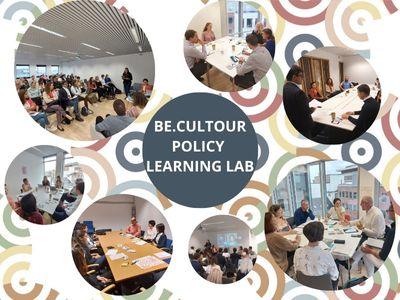
After a series of online community conversations, Be.CULTOUR mirrors finally met in person to exchange and learn from each other, fostering collaboration and synergies among the different project regional ecosystems.
The Policy Learning Lab was a moment for the Community to put into practice the methodologies developed by the Pilot Heritage Sites during the first period of the Project. Each site held a series of Local Workshops, involving their respective local stakeholders, which produced Local Action Plans identifying solutions to circular cultural tourism challenges of each Pilot region.
In the context of the event, 21 representatives from 11 mirrors regions, 12 representatives from the 6 pilot heritage sites, 3 project advisors and 10 consortium partners participated in 2 workshops, divided into 6 working groups, where they discussed, analyzed and identified solutions for specific challenges related to circular cultural tourism:
- CIRCULAR INVESTMENTS - Circular investments for infrastructure, mobility and tourism services
- DIGITALISATION - Digitalisation and smart data management: exploiting the potential of digital tools for better accessibility and monitoring of cultural sites
- SYNERGIES - Cooperation and collaboration towards higher circularity: heritage innovation networks potential, barriers and experiences
- INNOVATION ECOSYSTEM - Stimulating the local innovation and entrepreneurial ecosystem through cultural tourism: barriers and solutions/experiences
- HUMAN CAPITAL - Enhancing human capital towards human-centred development: skills, knowledge, education, culture & heritage
- REMOTENESS - Remoteness as value? Transformative travels in less crowded cultural sites
Through a series of open discussions facilitated by the PHS representatives, practical exercises fostering ideas and collaborations and creative games to design and test innovative approaches, participants identified a set of solutions to the assigned challenges.
However, for solutions to be implemented, they need to be supported by the right policies and EU initiatives, which can pave the way to more practical actions in the tourism sector, benefitting and including local communities and actors. Therefore, imagining an ideal future where their solutions had been implemented and achieved, our mirror regions had to propose a way in which the EU should support them in achieving their targets: What do we need? What can the EU do for us? What policies and measures could help or, on the contrary, damage the sustainability of tourism in my region?
As a result, a set of policy recommendations was produced, touching on different challenges and opportunities present in the circular cultural tourism sector.
